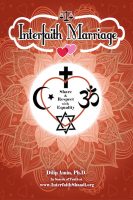There was no information available about interfaith marriages between the second generation of Dharmics to Abrahamics in the West. The author conducted the first such survey and published in 2008.
The landmark 2008 Pew Forum survey found that only 10% of Hindus in America married outside their faith. Although the survey covered 257 Hindu families, 86% of them were immigrants and 58% between the ages of 30-49. Thus, it focused on the first generation Hindu immigrants from India and reflects the norms of interfaith marriages in India. It does not provide information on the much higher rate of interfaith marriages that American-born, second generation Hindus are entering into. The author conducted an independent survey showing 38% of the marriages of young Hindus, Jains and Sikhs are to people of Abrahamic faiths (Christians, Jews and Muslims) as shown in Table 2.
Common family names of Hindus, Jains and Sikhs (followers of Dharmic traditions) were picked from the Macy’s marriage registry for our data analysis. Non Hindu-sounding first names (like Fatima Patel or Anthony Reddy) were removed. Though individuals’ religious preferences were not verified, the consistency of results across these common family names gives some validity to our conclusions. The results clearly show that at least a third of the young Dharmics have selected an Abrahamic partner as their life mate. The outcome was similar for males and females in analysis of subgroups.

Historically in India, interfaith marriages among Hindus, Jains and Sikhs are common, but not with Muslims or Christians because there are fundamental differences between the beliefs and practices of the two major groups of religions—the Dharmic and the Abrahamic. Now in America, interfaith marriages between these groups are taking place in larger numbers.
In reality, a marriage is not only between two individuals, but also to some extent, between two extended families. Many times, major difficulties may arise when subtle pressure is applied by the extended family for religious conversion before a church wedding or Islamic nikaah takes place. The challenges may get harder as years go by, especially when time comes to decide the religious fate of the children from the marriage. For example, Islam requires that children of mixed marriages must be raised in the Islamic faith. The Catholic Church strongly advocates that the Catholic parent should do everything possible to insure that a child is baptized and raised as a Catholic.
It remains to be seen how followers of Dharmic and Abrahamic faiths manage their fundamental religious differences in the interfaith marriages.
 A Chapter from the book Interfaith Marriages: Share and Respect with Equality is posted here. View some of others chapters from the book here.
A Chapter from the book Interfaith Marriages: Share and Respect with Equality is posted here. View some of others chapters from the book here.
Video messages by the author
How to purchase the book (as low as Rs.270 or $14.99).
Return to Home, Blogs, How to Share? Facebook, Youtube, Twitter, Book, Media.

